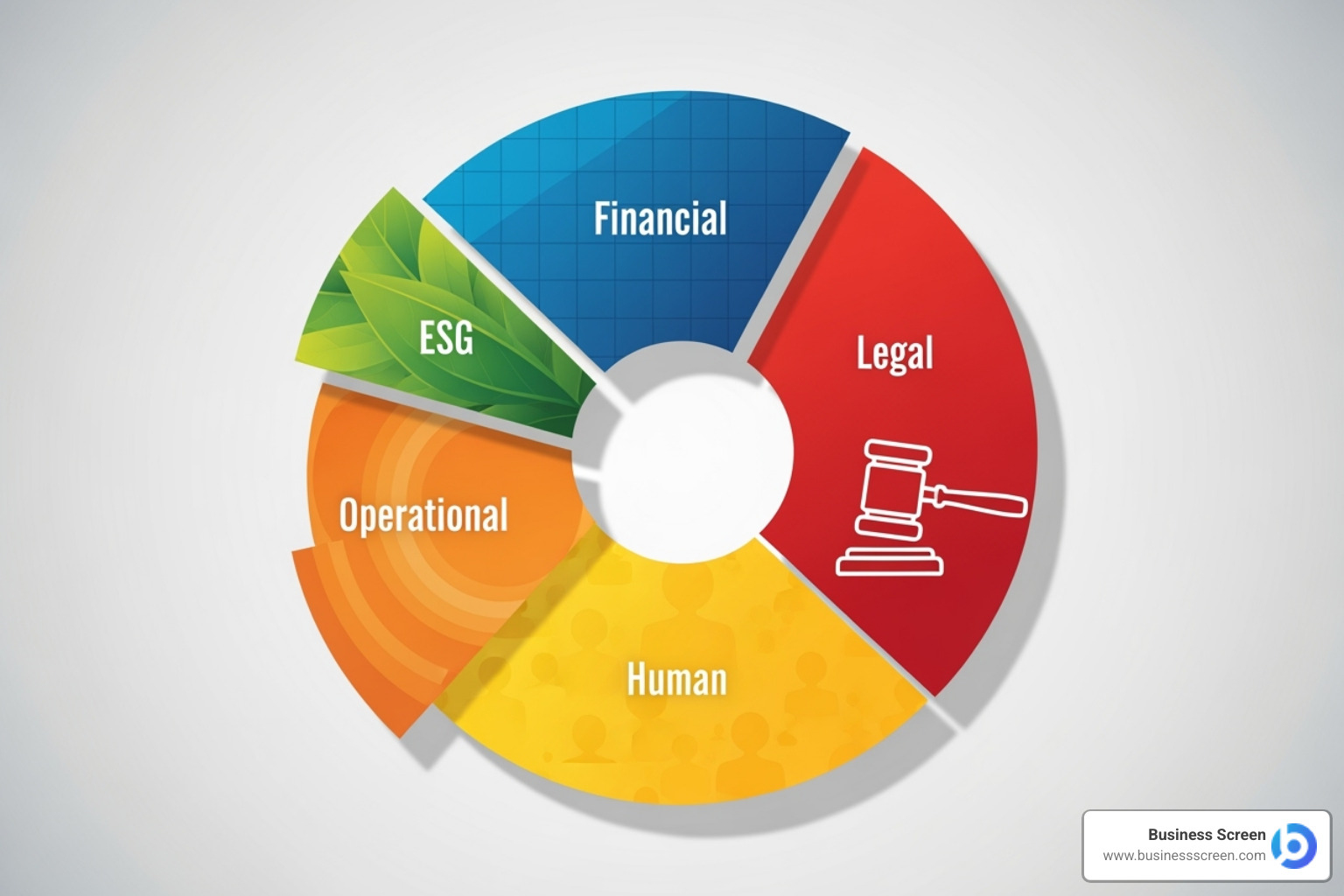
Master company due diligence. Uncover risks, ensure smart investments, and make informed decisions with our expert guide.

Company due diligence is the systematic investigation of a business before entering into a major transaction. It involves:
Timeline: Typically 30-60 days for most transactions.
Purpose: To protect against financial loss, legal liability, and reputational damage.
Research shows that 70% to 90% of M&A deals fail, often because companies ignore warning signs that proper due diligence would have uncovered. Effective due diligence goes beyond the balance sheet to assess the human element and operational realities that financial statements can't reveal.
With new sanctions increasing 50% in 2023 and evolving regulatory standards, the cost of getting it wrong has never been higher. Whether you're acquiring a company, onboarding a vendor, or considering a partnership, due diligence is your first line of defense.
I'm Ben Drellishak, owner of Business Screen. I've spent years helping businesses avoid costly mistakes through comprehensive company due diligence investigations, and I've seen how the right approach can mean the difference between a successful deal and a financial disaster.

Company due diligence is detective work for business deals. It's the process of investigating, verifying, and assessing a potential business partner, acquisition target, or investment opportunity before you commit money or reputation. Think of it like checking under the hood before buying a used car—except the stakes are much higher.
The concept has legal roots in the Securities Act of 1933, which required brokers to disclose material information about investments. Today, its scope is much broader, covering everything from Investment Due Diligence: Private Equity & Venture Capital to simple partnerships.
This matters because getting it wrong is costly. With new sanctions increasing by 50% in 2023 and 70% to 90% of M&A deals failing due to overlooked red flags, thorough vetting is an insurance policy against expensive mistakes.
Effective due diligence is a strategic tool used to:

The depth and focus of company due diligence change depending on the situation:
Effective company due diligence is broken into several specialized areas to ensure a complete picture of the target company, not just the glossy brochure version.

This is the process of taking the company's financial pulse. We analyze multi-year financial statements, scrutinize revenue trends and profit margins, and review debt schedules. We also verify tax compliance and analyze cash flow, which often reveals the true story of a company's health. While public companies follow standards like GAAP or IFRS, private company financials require deeper verification.
This area checks for legal landmines. We review all significant contracts, investigate litigation history, and verify intellectual property ownership. We also confirm that all necessary permits and licenses are current and examine the corporate structure. Compliance is a major focus, covering industry-specific rules (e.g., SEC, FINRA, HIPAA) and international standards. Our guides on Customer Due Diligence: Financial Services and International Due Diligence Background Checks offer more detail.
Here, we assess how the company makes money and if it's sustainable. We analyze the business model, evaluate the supply chain for vulnerabilities (see our Supply Chain Risk Management guide), and assess IT systems and cybersecurity, often verified with SOC 2 reports. We also review the customer base, market position, and sales and marketing strategy.
Often overlooked, this is where many deals fail. We conduct a leadership team assessment, review employee contracts and compensation, and analyze organizational culture and staff turnover. As noted in Harvard Business Review's articles on Human Due Diligence and why you Don't Make This Common M&A Mistake, ignoring cultural factors is a major risk. We also identify key personnel dependencies.
Environmental, Social, and Governance (ESG) factors are now business necessities. We assess environmental impact by reviewing sustainability practices and EPA reports. We evaluate social practices against frameworks like the UN's human rights principles and review governance policies for ethical leadership. Finally, we assess reputational risks by analyzing public perception and media coverage, looking for key ESG factors in their reporting.
While every investigation is unique, the company due diligence process follows a proven, four-step roadmap to ensure no critical pieces are missed.
This foundational phase separates successful investigations from scattered fishing expeditions. It involves defining objectives based on the deal's goals, assembling a team of internal and external experts, and often signing a Letter of Intent (LOI) to secure an exclusive investigation period. We then create a detailed Due Diligence Checklist for Buying a Business and establish a realistic timeline, typically 30 to 60 days.
This is where the detective work begins. We gather documents from Virtual Data Rooms (VDRs) and issue detailed document requests for anything missing. Site visits and management interviews provide crucial on-the-ground and human perspectives that documents can't. At Business Screen, our investigator-led methodology focuses on verifying data accuracy. We don't take information at face value; we cross-reference, research, and conduct background checks as outlined in our guide on How to Conduct a Due Diligence Background Check.
In this phase, we connect the pieces to see the full picture. We focus on identifying inconsistencies between documents and interviews, assessing financial health beyond surface numbers, and evaluating operational weaknesses that could impact future performance. Every risk is scored by severity to prioritize what matters most. Our experience helps in uncovering subtle red flags that are essential for effective Third Party Risk Management.
All investigation work culminates in a comprehensive report to guide the final decision. We summarize findings into a clear narrative of strengths, weaknesses, opportunities, and threats. The final due diligence report provides actionable recommendations: proceed, renegotiate the price, add protections, or walk away. These findings also inform post-transaction integration planning, creating a roadmap for success after the deal closes. The entire process typically takes 30 to 60 days.
Company due diligence is rarely straightforward. Knowing the common obstacles and red flags is key to avoiding a costly mistake.

Investigators frequently encounter the same challenges:
Our investigator-led approach has trained us to spot these critical warning signs:
Effective company due diligence combines a systematic approach with the best available tools. The future of due diligence is faster, more accurate, and more integrated with overall risk management.
Successful programs share several characteristics:
This approach is explored further in our guide to Business Partner Due Diligence.
Technology is revolutionizing due diligence:
Due diligence delivers the greatest value when it’s fully integrated into a company’s corporate governance and Enterprise Risk Management (ERM) framework. The board of directors plays a critical oversight role, ensuring that due diligence findings inform major strategic and compliance decisions. Meanwhile, ERM systems connect these findings to broader risk assessment and compliance monitoring—helping organizations proactively manage operational, financial, and reputational risks rather than react to them.
The due diligence process varies significantly between public and private companies. Public companies benefit from a wealth of publicly available financial information—such as 10-K filings, quarterly reports, and SEC disclosures—offering transparency into their accounting practices and regulatory compliance under GAAP or IFRS standards. However, while this data is accessible, it often demands deep analytical review to detect hidden risks, such as off-balance-sheet liabilities or governance weaknesses.
Private companies, on the other hand, operate with limited disclosure obligations. Accessing their financial and operational information often requires direct requests, interviews, or investigator-led verification. Because there’s less regulatory oversight, accounting and reporting practices may vary widely, making independent verification essential. Though more labor-intensive, private company due diligence can yield deeper operational insights, especially when on-the-ground intelligence and local expertise are incorporated.
In short, public companies offer more transparency, but private companies can provide richer context once granted access. Both require skilled analysis, corroboration across data sources, and a governance-minded approach to reveal the full picture of financial integrity, management behavior, and long-term risk.
Company due diligence is an investigative process to verify information and assess risks before a major business transaction. It is essential for mitigating financial loss, uncovering hidden liabilities, and ensuring regulatory compliance. With M&A failure rates as high as 90%, thorough vetting is a critical defense against costly mistakes. For more details, see our guide on What is a Due Diligence Background Check and Why Do One?.
Company due diligence is broken into several key areas to provide a holistic view of a target entity. These include Financial, Legal and Regulatory, Operational and Commercial, Human and Cultural, and ESG and Reputational due diligence. Each component focuses on a distinct aspect, from analyzing cash flow and contracts to assessing leadership integrity and environmental impact. This multi-faceted approach is crucial for identifying all potential risks and opportunities. For a detailed look at international checks, see our guide on International Due Diligence Background Checks.
The company due diligence process follows a structured, four-step approach to ensure thoroughness and clarity. Step 1: Scoping involves defining objectives and creating a plan. Step 2: Information Gathering focuses on collecting and verifying documents and conducting interviews. Step 3: Analysis is where risks are identified and assessed. Step 4: Reporting culminates in a comprehensive report with actionable recommendations. This systematic process, detailed in our Due Diligence Checklist for Buying a Business, helps clients make confident, informed decisions.
Conducting company due diligence involves overcoming common challenges like fragmented data, seller impatience, and confirmation bias. It also requires a keen eye for red flags that signal potential trouble. Key warning signs include inconsistent financial records, unclear ownership, high customer concentration, unresolved litigation, and high turnover in key roles. Identifying these pitfalls early is essential to avoid a bad deal. Learn more about selecting the right partner in our guide on How to Choose Among Due Diligence Companies.
Effective company due diligence relies on best practices like establishing clear protocols, using cross-functional teams, and leveraging technology. The future of due diligence is being shaped by AI-driven analysis, centralized platforms, and predictive analytics, making the process faster and more insightful. Integrating due diligence with an organization's Enterprise Risk Management (ERM) framework and understanding the differences between vetting public and private companies are also key to a successful program. For more on this, see our Business Partner Due Diligence guide.